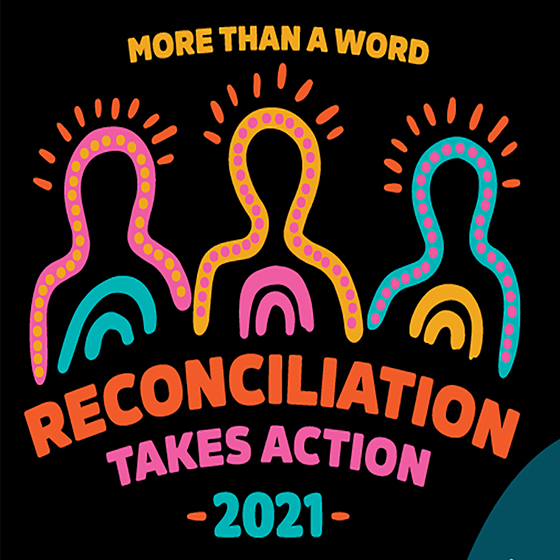What is reconciliation week?
“National Reconciliation Week ‘NRW’ is a time for all Australians to learn about our shared histories, cultures, and achievements and to explore how each of us can contribute to achieving reconciliation in Australia. The dates for NRW are the same each year; 27 May to 3 June. These dates commemorate two significant milestones in the reconciliation journey— the successful 1967 referendum, and the High Court Mabo decision respectively. Reconciliation must live in the hearts, minds and actions of all Australians as we move forward, creating a nation strengthened by respectful relationships between the wider Australian community, and Aboriginal and Torres Strait Islander peoples.” – Reconciliation Australia 2021.
“2021 marks twenty years of Reconciliation Australia and almost three decades of Australia’s formal reconciliation process.” – Reconciliation Australia 2021. Reconciliation Australia’s Theme for 2021 is ‘More than a word. Reconciliation takes action.’ Recognising the need for more impactful action towards reconciliation. “We all have a role to play when it comes to reconciliation, and in playing our part we collectively build relationships and communities that value Aboriginal and Torres Strait Islander peoples, histories, cultures, and futures.” – Reconciliation Australia 2021.
For this year’s NRW we have chosen to reflect upon and acknowledge the experiences of Aboriginal and Torres Strait Islander peoples, families and communities since colonization and the impact these experiences have on the daily lives of Aboriginal and Torres Strait Islander peoples today. We acknowledge the strength of the Survivors and reflect on how we can play a part in the healing process. We are also using this week as a kickstarter to reassess and redesign our processes to ensure we are supporting reconciliation.
We encourage you to acknowledge these experiences and to remember the effects that are an ongoing source of intergenerational trauma for Aboriginal and Torres Strait Islander peoples, families and communities. We encourage you to reflect and learn more about our history and take action towards reconciliation in all settings in your life.
Steps we are taking
The LGBTI Legal Service strongly believes that we all have a role to play when it comes to reconciliation. We also believe that cultural safety is an ongoing learning journey which is why we reassess and redesign our systems and actions to continually improve our cultural safety. We have created a community at our service that values Aboriginal and Torres Strait Islander peoples, histories, cultures, and futures. Our workforce is currently made up of 33.3% of Aboriginal staff, which we find to be important in taking action towards reconciliation.
We acknowledge that public spaces, services, workplaces, schools, etc. are not always safe or welcoming for Aboriginal and Torres Strait Islander people and the negative impact that this can have. Therefore, we have committed to creating a culturally safe space for people to access our service.
Things we do in our everyday work environments to promote cultural safety include; maintaining a welcoming attitude and environment for Aboriginal and Torres Strait Islander peoples. Always acknowledging Traditional Custodians of the Land before meetings and events as well as in emails and on our social media. We engage with and consult Aboriginal and Torres Strait Islander people, their families, services and the wider community when designing, delivering and reviewing our services based on their priorities and the needs they identify. We are committed to ensuring the events, programs and services we provide are culturally safe. Additionally we acknowledge all cultural events such as sorry day, NRW, NAIDOC, Mabo Day and more. We are working to ensure that every part of our service is culturally appropriate, from our client interactions to our recruitment processes. We assess our policies routinely and continue to improve them. We also endeavor to have all of our staff attend cultural safety training and ensure it is kept up-to-date. We also keep in mind the importance of privileging and amplifying Aboriginal and Torres Strait Islander voices when taking action for reconciliation and justice.
We hope to see a just, equitable and reconciled Australia, but to achieve this we all need to work together so that Aboriginal and Torres Strait Islander peoples are able to equally contribute to the daily life of the Nation.
If you need help in taking action for reconciliation please head to Reconciliation Australia’s website, they have a great resource called ’20 Actions for Reconciliation in 2021′
